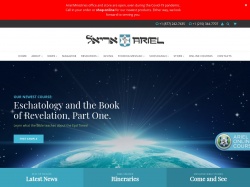The mystics say that God made Adam in the image of the Heavenly Adam, the firstborn of all creation, the spiritual image of God. The theology of the heavenly Adam attempts to reconcile the conflict between the idea that God is incorporeal, that is without image and form, and the idea that man is created in the image of God.
The apostles say, “Yeshua is the image of the invisible God, the firstborn of all creation” (Colossians 1:15). “He is the radiance of His glory and the exact representation of His nature” (Hebrews 1:3).
Paul also alludes to the same mystical ideas when he states: “Just as we have borne the image of the earthly [i.e., Adam], we will also bear the image of the heavenly [i.e., Yeshua]” (1 Corinthians 15:49). Paul calls Adam “the first Adam” and Messiah “the second Adam.” According to Paul, “The first Adam is from the earth, earthy; the second Adam is from heaven” (1 Corinthians 15:47), “an impression of Him who was to come” (Romans 5:14). That is to say that Adam was made in the image of Messiah.
Tz’nah Ur’enah says, “Just as Adam was created in God’s image, so the Messiah is anointed by God, and God’s Spirit will be upon him.” God created Adam in His image, and the Messiah is the image of God: “He is the image of the invisible God” (Colossians 1:15); “He is the radiance of His glory and the exact representation of His nature” (Hebrews 1:3). Luke even refers to Adam as “the son of God” (Luke 3:38).
The Messiah, as the second Adam, provides humanity with a fresh start. In Messiah, the human race can go back to Eden, so to speak, and start over in perfect innocence and righteousness.
Adam’s name means “man.” Sin and death came to humanity as the result of one man’s sin. Through one single act of disobedience, Adam forfeited his right to the tree of life, so human death came through Adam. Death came “even over those who had not sinned in the likeness of the offense of Adam” (Romans 5:14), which is to say that everyone dies.
It does seem frightfully unfair that one man’s single transgression consigns all humanity to death, but it is equally unfair that one man’s righteousness also offers all of humanity the reward of righteousness: “The right to the tree of life” (Revelation 22:14). Those who cast their allegiance with “the last Adam,” the life-giving Spirit, receive that reward.
Messiah is a second Adam, but unlike the first Adam, He did not transgress. If the first Adam’s sin was sufficient to merit death for all mankind, the righteousness of Messiah—the last Adam—is sufficient to merit life for all of us: “For as in Adam all die, so also in Messiah all will be made alive” (1 Corinthians 15:22). This is the hope of eternal life through the resurrection of the dead. Resurrection reverses Adam’s bane.
B’reisheet – בראשית : “In the beginning”
Torah : Genesis 1:1-6:8
Haftarah : Isaiah 42:5-43:10
Gospel : John 1:1-18
Source: Torah Portion



